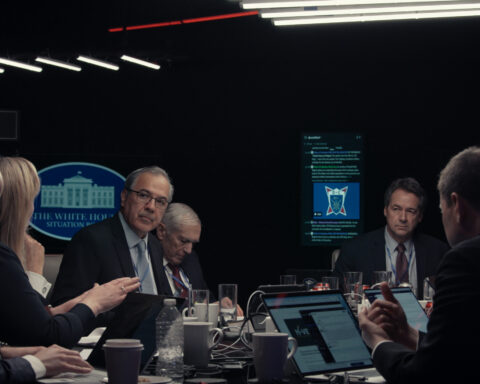An Insignificant Man
(India, 100 min.)
Dir. Khushboo Ranka, Vinay Shukla
Programme: TIFF Docs (World Premiere)
Contemporary mainstream documentary aesthetics seem to be predicated on an anxiety about boring the audience. The three-act narratives, two-dimensional characters, fast-paced editing and manipulative soundtracks of the majority of these films may maintain the cachet of “reality” simply by virtue of being unstaged, but make no mistake: this is Hollywood by another name.
An Insignificant Man, a documentary following the “Indian Bernie Sanders,” Arvind Kejriwal’s, 2013 campaign for Chief Minister of Delhi, is just this kind of thing. An enjoyable enough experience by virtue of generally capable execution of Hollywood narrative technique, and illuminating for somebody unfamiliar with Indian politics, it’s really a hit-and-miss attempt at shoehorning Kejriwal and his Aam Aadmi Party into a triumphant narrative of empowered democracy.
The film does a decent enough job at posing its argument, showing the problems in Delhi that Kejriwal is railing against, chiefly corruption, price-gouging, and political violence. There are obvious parallels between Kejriwal’s AAP and Bernie Sanders in U.S., Jeremy Corbyn in the U.K., Podemos in Spain, and Syriza in Greece in the way they funnel popular discontent and resentment of corrupt elite into a new leftist electoral movement centred on a charismatic leader. The film glosses over some of the emergent and by now familiar issues around this political phenomenon without offering much in the way of fresh insight.
For the most part, it’s doc-by-numbers: Kejriwal quickly emerges as a charismatic idealist with the political theorist Yogendra Yadav as the indispensable right-hand man. There’s the Hillary Clinton-esque villain in entrenched Chief Minister Sheila Dikshit; there are questions around Kejriwal’s populist and authoritarian streaks, complicating his oft-stated democratic ideas; there’s a wave of support during a hunger strike that ebbs in a manufactured scandal; there’s the death, presumed but not proven to be assassination, of candidate Santosh Koli; and there are flagging poll numbers capped by a surprising election victory.
Still, the impression is always that there is more to the story. There’s an episode about halfway through the film that unintentionally puts this in mind. One of Kejriwal’s candidates is the victim of a doctored video appearing to show her accepting a bribe, damaging the party’s clean image, which is its chief selling point. This introduces two problems. First, the entire thing is built up into a scandal and then dropped without a satisfactory conclusion. Second, it gets you thinking about how the film itself is shaping its message.
There are notable gaps throughout the film. For instance, there is no mention whatsoever of Kejriwal’s wife—to whom he’s been married since 1994, and whose work as a public servant both kept her away from her husband’s revolutionary political activities and, in fact, financially enabled them. Generally speaking, men dominate the political world in this film; apart from Dikshit and the martyred Koli everyone in the room is male. Given that gender issues in India—from rape to arranged marriage to honour killing to lack of toilets—are constant news items, how seriously are we to take this revolutionary boys club that never addresses these concerns?
Another problem: a moment’s research reveals that the AAP was born out of the schism from a prior organisation, India Against Corruption, led by Kejriwal and Anna Hazare (Anna is a male name in India). Their acrimonious split apparently arose over whether or not to take the organisation into the political arena; Hazare was opposed and told Kejriwal not to use his photo or name during the campaign. Maybe this explains his absence from the film, but it doesn’t excuse it. If documentary, as the preeminent medium for long-form, long-term investigative journalism, is to have a responsibility to truth, these oversights are inexcusable. What seems to have happened, here as elsewhere, is that complex truth is sacrificed in the name of narrative.
Nowhere is this clearer than in the film’s epilogue. Onscreen text tells us that Kejriwal and Yadav parted ways, with the former main strategist expelled from the AAP and starting his own party. It goes on to state that Kejriwal shut down parliament for a year in protest of the blocking of an anti-corruption bill; that he lost the national elections in a landslide and that he then won new Delhi elections in a landslide of his own, taking 67 out of 70 seats. Obviously, this is a much more complicated story. Where the film—adopting Kejriwal’s quasi-humble declaration upon his electoral victory that he is “an insignificant man” as title and as message—essentially celebrates Kejriwal’s idealism, offering an apologia for his occasional demagoguery and finding vindication for his message and personality in his election victory, the truth may be far more complicated.
In spite of my disappointment in the film’s lacunae, the film is worth watching for what it does do. While human rights issues in India regularly make the news here, the reality of Indian politics doesn’t get a lot of play in the western world, and it is no small achievement that An Insignificant Man sheds some light on it. Arvind Kejriwal is clearly an important figure that people familiar with Sanders et al. should know about, his story speaking to the genuinely global reach of anti-elite sentiment.
An Insignificant Man screens:
-Tuesday, Sept. 13 at 9:30 PM at Cineplex Scotiabank
-Sunday, Sept. 18 at 12:30 PM at Cineplex Scotiabank
TIFF runs Sept. 8 – 18. Please visit tiff.net for more information.












